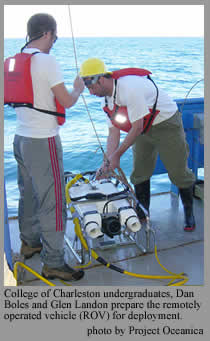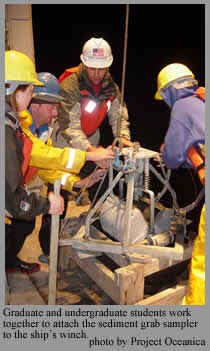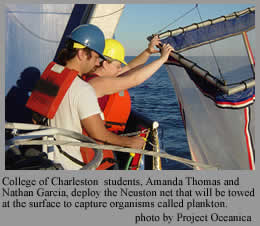
| The
Transect Program: Pathways to Oceanographic Research Project Overview |
| View
an informational PhotoDocumentary on the Transect Program |
 |
 Project
Oceanica at the College of Charleston has initiated an exciting new
program called Transects. The Transects Program is designed to immerse
and engage undergraduate and graduate students in oceanographic research
by taking them to sea to collect biological and geological samples and
later analyze the data in the laboratory. Late in November 2003, a total
of 13 students (8 undergraduate and 5 graduate students) sailed with
two CofC faculty members, Drs. Leslie Sautter (Geology Department) and
Gorka Sancho (Biology Department) aboard the 92-foot research vessel
"Savannah" for five days. They worked 8-hour shifts around
the clock, employing a wide range of oceanographic equipment to sample
the sea floor sands and the organisms living on the bottom and in the
surface waters. “The students were amazing,” Sautter commented.
“After only 24 hours they understood the basics of the sampling
process and took control of the entire operation. All Gorka and I had
to do was direct traffic and oversee the sampling.” Masters-level
students served as mentors for the undergrads, and all students worked
in collaborative teams to get the job done efficiently and safely. “They
left the dock as students and returned as ocean scientists,” Sautter
added. Project
Oceanica at the College of Charleston has initiated an exciting new
program called Transects. The Transects Program is designed to immerse
and engage undergraduate and graduate students in oceanographic research
by taking them to sea to collect biological and geological samples and
later analyze the data in the laboratory. Late in November 2003, a total
of 13 students (8 undergraduate and 5 graduate students) sailed with
two CofC faculty members, Drs. Leslie Sautter (Geology Department) and
Gorka Sancho (Biology Department) aboard the 92-foot research vessel
"Savannah" for five days. They worked 8-hour shifts around
the clock, employing a wide range of oceanographic equipment to sample
the sea floor sands and the organisms living on the bottom and in the
surface waters. “The students were amazing,” Sautter commented.
“After only 24 hours they understood the basics of the sampling
process and took control of the entire operation. All Gorka and I had
to do was direct traffic and oversee the sampling.” Masters-level
students served as mentors for the undergrads, and all students worked
in collaborative teams to get the job done efficiently and safely. “They
left the dock as students and returned as ocean scientists,” Sautter
added.
Five days at sea offered challenges for some, as rough seas were encountered at the onset. On day two, however, the seas calmed and everyone found their sea legs. From that point on, the cruise ran smoothly and was very productive. Several students felt right at home on a ship and didn’t want to get off at the end. Meghan Chafee, a marine biology major who’d never been on a cruise wrote on her student survey, “I honestly loved it. All of it. Nothing ever got boring.” She added that she hoped to see herself as an oceanographer in the future….”forever.” Along with
the collection of sand and organisms, students sampled the water chemistry
and measured In the spring semester, each student will enroll in Sancho’s and Sautter’s course, Oceanographic Research. They will analyze most of the 280 samples collected, while conducting individual research projects. By the semester’s end each will present their results in a public forum and post their results on the Project Oceanica website at http://oceanica.cofc.edu. Sancho emphasized that, “Our objective is to prove that students can collect, process, and analyze research-quality data while they learn oceanography first-hand.” All of the data collected will be posted on the website on a growing database for anyone to use for educational or scientific purposes. “We hope that there will be additional Transects Programs along other parts of the southeast coast,” Sautter added.
For more information on this program please contact Project Oceanica at oceanica@cofc.edu |

 Transects
is funded for two years by a grant written by Sautter and Sancho from
the National Science Foundation. A total of four 5-day research cruises
and follow-up Oceanographic Research courses will be offered over
the 2 year project. On each cruise, the same stations sampled on last
week’s cruise will be revisited so that students will be able
to examine the seasonal and inter-annual changes that occur. The next
cruise is scheduled for May and the course will follow during the
first summer session. A new scientific crew will participate on each
cruise.
Transects
is funded for two years by a grant written by Sautter and Sancho from
the National Science Foundation. A total of four 5-day research cruises
and follow-up Oceanographic Research courses will be offered over
the 2 year project. On each cruise, the same stations sampled on last
week’s cruise will be revisited so that students will be able
to examine the seasonal and inter-annual changes that occur. The next
cruise is scheduled for May and the course will follow during the
first summer session. A new scientific crew will participate on each
cruise.